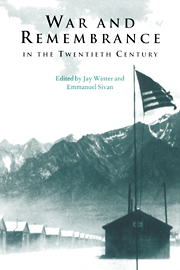Book contents
- Frontmatter
- Contents
- Preface
- Introduction
- 1 Setting the framework
- 2 Forms of kinship and remembrance in the aftermath of the Great War
- 3 War, death, and remembrance in Soviet Russia
- 4 Agents of memory: Spanish Civil War veterans and disabled soldiers
- 5 Children as war victims in postwar European cinema
- 6 From survivor to witness: voices from the Shoah
- 7 Landscapes of loss and remembrance: the case of Little Tokyo in Los Angeles
- 8 The Algerian War in French collective memory
- 9 Private pain and public remembrance in Israel
- 10 Personal narratives and commemoration
- 11 Against consolation: Walter Benjamin and the refusal to mourn
- Index
- Studies in the Social and Cultural History of Modern Warfare
8 - The Algerian War in French collective memory
Published online by Cambridge University Press: 27 October 2009
- Frontmatter
- Contents
- Preface
- Introduction
- 1 Setting the framework
- 2 Forms of kinship and remembrance in the aftermath of the Great War
- 3 War, death, and remembrance in Soviet Russia
- 4 Agents of memory: Spanish Civil War veterans and disabled soldiers
- 5 Children as war victims in postwar European cinema
- 6 From survivor to witness: voices from the Shoah
- 7 Landscapes of loss and remembrance: the case of Little Tokyo in Los Angeles
- 8 The Algerian War in French collective memory
- 9 Private pain and public remembrance in Israel
- 10 Personal narratives and commemoration
- 11 Against consolation: Walter Benjamin and the refusal to mourn
- Index
- Studies in the Social and Cultural History of Modern Warfare
Summary
From November 1954 to March 1962 French troops fought in Algeria, in order to keep Algeria a part of France. This was a conflict which, in France, was not officially termed a war at all. The end result was the independence of Algeria under the control of the FLN (National Liberation Front), and the departure for France of 1 million French people who thought life would be impossible in Algeria under the new regime.
This war was arguably the longest war of decolonization, and although French forces undoubtedly were better equipped and more numerous than the Algerian fellaghas, it still cost 35,000 French soldiers their lives. However, it has disappeared from collective memory. No agency of remembrance did work to commemorate the memories of this war. Jean-Pierre Rioux pointed out this fact effectively in a paper published in 1990: ‘Since 1962’, he wrote, ‘there is no French national memory of the Algerian conflict; this un-named war never received the honours of memory.’ This chapter deals with the reasons why in France there is no public memory of the Algerian War.
The Algerian War
Algeria was an integral part of France. During the Second World War, de Gaulle's provisional government moved from London to Algiers, where it was on French territory. It was divided into three départements and had roughly the same administration as others in metropolitan France. When needed, bureaucrats and teachers were appointed to Algerian selection boards and schools as well as to metropolitan ones by committees in the central administration. Many civil servants began their career there and later went back to France.
- Type
- Chapter
- Information
- War and Remembrance in the Twentieth Century , pp. 161 - 176Publisher: Cambridge University PressPrint publication year: 1999
- 9
- Cited by



